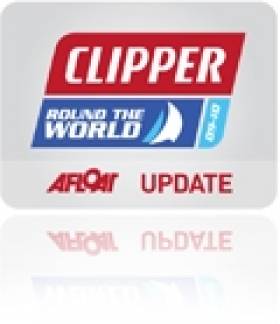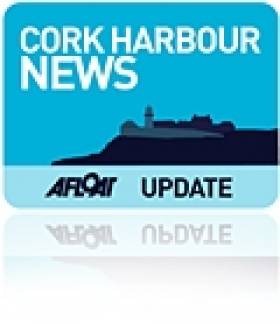Displaying items by tag: Port of Cork Marina
Cork Clipper Brings €5.6m in Economic Return to the Local Economy
An economic impact analysis was carried out by three MBS students from University College Cork (Ger Swayne, Lorcan Daly & Stephen Hicks) which reported an economic impact of €5.6m with accommodation and food and beverage accounting for 65% of the figure. The students worked according to the standard Failte Ireland festival report methodology which includes qualitative and quantitative research.
At today's launch Deputy Mayor Of County Cork Cllr John O Sullivan stated 'the festival gave a great boost to the Kinsale area early in the summer season and it also ensured that works were carried out in the town prior to the event that benefitted both locals and visitors. In particular the refurbishment of the Old Mill as an exhibition venue was a huge new resource for the town.'
The media report was carried out by IFM Sports Marketing Surveys and was commissioned by Clipper Ventures who run the Clipper Round the World Yacht Race. Global media coverage for the whole race is estimated at over $100m and Cork's share of this is very substantial at $26.5m. These figures are boosted by a Discovery Channel global deal that has been agreed with the TV series producers and Clipper Ventures. An Irish broadcaster for the series will be announced in the coming weeks.
Commenting on today's results, Fiona Buckley, Head of Operations, Fáilte Ireland stated 'from a tourism perspective the media coverage that Kinsale, Cork and the region received through the Clipper project will ensure that Cork is top of mind as a tourism destination in the coming years. In addition the economic report found that 98% of the overseas visitors would return to Cork as a result of the Clipper festival and 97% would recommend Cork to their friends.'
The festival in Kinsale was helped by the arrival of the fleet of 10 Clipper yachts six days ahead of schedule and the fantastic weather during that period. When the yachts moved to the new Port of Cork Marina on 07 July the weather changed dramatically and this had an impact on the attendance figures in the city.
'When the fleet arrived in Cork city there was a crowd of over 10,000 people to welcome the fleet to the new Cork City Marina which was installed to welcome the Race but is also a lasting legacy to marine tourism in the region. We would like to thank the Port of Cork for investing in this new permanent infrastructure with the support of Cork City Council.
This new Marina will play host to other marine events over the coming years.' Stated Lord Mayor Cllr Michael O Connell Clipper Race Chairman, Sir Robin Knox-Johnston, said, "Cork and Kinsale were fantastic hosts, providing marvellous entertainment during
the race festivals in both locations and I am pleased to see that they reaped the rewards. The welcome visitors received will ensure a lasting tourism legacy for years to come. "
The return on investment for the project is estimated at over 300% which is above average for hosting a sporting event of this calibre.
Hundreds Gathered for Cork Harbour Open Day
Cork Harbour Open Day proved to be a great success with hundreds of people enjoying the harbour and the free family events on offer. Throughout the day, the LE Aoife at Horgan's Quay welcomed families and children on board where they were given a tour of the ship and an insight into Navy life. The sailing race from Cobh to Blackrock, sponsored by the Port of Cork, was a huge success with over 50 boats taking part. Blackrock Castle opened the tower to the public and was busy throughout the day with people using the tower to watch the boats sail through the finish line at Blackrock.
Camden Fort in Crosshaven attracted hundreds of visitors to see the newly restored rooms and to learn more about the 'Rescue Camden' project. Also in Crosshaven the Coastal Rowing Association organised their end of season championship regatta where Passage West won all eleven races and the RNLI Station opened to the public.
'Dreamer' the fastest rigid inflatable boat (RIB) round Ireland was at the Port of Cork Marina for all to see. Built locally by Gale Force Ventures in Carrigaline and owned by current round Ireland record holder, Phillip Fitzgibbon from Co. Kerry, the 10 metre RIB can reach a speed of 65 knots.
Further events such as the World Rescue Challenge on North Custom House Quay, attracted large crowds over the whole weekend and in Cobh, the 'See You in Cobh' committee organised a crab fishing event on the promenade with over 80 children taking part.
One of the organisers of Cork Harbour Open day, Sara Dymond was thrilled with the day saying: 'The sun shone in Cork Harbour on Saturday and showed the harbour in all its glory. Cork Harbour Open Day aims to raise awareness of the different activities available for people in the harbour both on and off the water and this year we saw an exceptional turnout of people of all ages. There are endless activities to do in the Harbour and this year proved how popular the harbour is and how much people enjoy it. We hope to expand on this for next year.'
She continued: 'Thank you to all those who arranged events and helped out on the day.'
The idea for a Harbour Open Day emerged from discussions between various stakeholders involved in the development and implementation of the Integrated Strategy for the Harbour. A group comprising representatives from UCC, City and County Councils and the Port of Cork set about working together to engage users of the Harbour and to organise the Open Day.
Images from Bob Bateman on the Afloat Gallery HERE































































